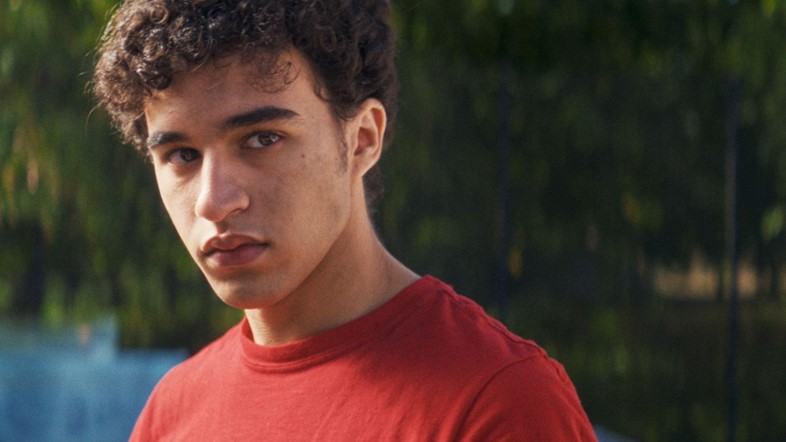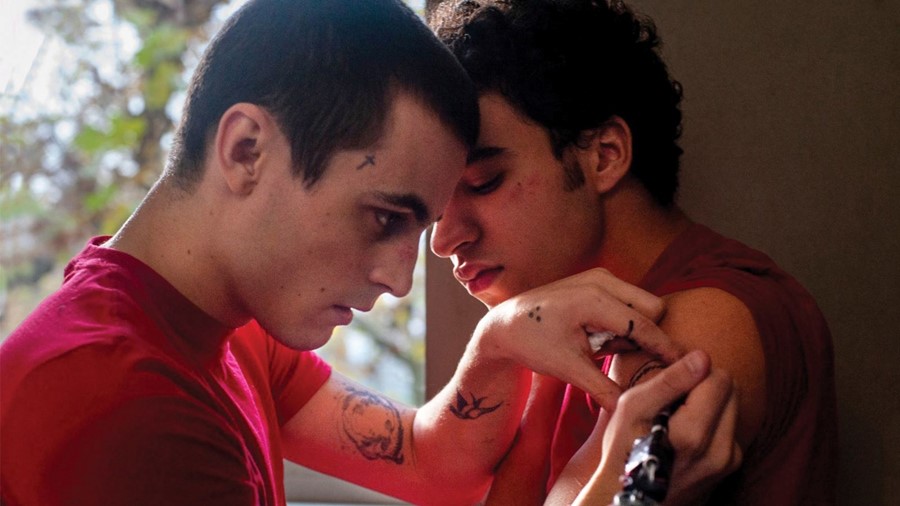The breakout stars of Zeno Graton’s soulful debut talk fateful smoke breaks, intimacy on set, and finding utopia through film
When Khalil Ben Gharbia met Julien de Saint Jean on a smoke break outside a Paris casting studio, he had no idea this was the guy he was about to audition with. “I don’t know, maybe it was fate,” says Gharbia of his co-star in The Lost Boys, a prison drama with a soulful ache at its core. “But I already felt something.” De Saint Jean was doing chemistry reads for Zeno Graton’s feature debut about two teens in a Belgian youth detention centre who fall desperately in love. He’d landed the role of William, and had already met five aspiring Joes – his lover in the film – when in walked Gharbia, the sixth, and something clicked.
The Lost Boys is a late contender for the year’s best romantic drama, carried by its young French leads in performances of graceful physicality. The story centres on Joe (Gharbia), an emotionally numbed-out teen seemingly indifferent to his fate. He comes alive when William (De Saint Jean) is transferred to the centre, and the two begin an affair that puts their very freedom on the line.
Graton’s film was shot next door to a real youth detention centre, where the cast would “would see the kids every day, watching us from afar,” says Gharbia. “It was disturbing at first, because we’re talking about real people who are suffering here and I felt like what we were doing was not legitimate. But then we met with them and we were able to become more like mirrors in a way, reflecting what they had experienced. I think that was the only way for us to tell this story.”
The film is personal for Graton, a queer Belgian-Tunisian director who saw his own cousin become ensnared in the youth detention system. But, rather than stressing the harshness of these people’s lives, the film leans into the tenderness of Joe and William’s relationship, consummated in quick, gasping asides that shiver with the thrill of sexual discovery. Gharbia and De Saint Jean worked with an intimacy coordinator on set, still a rarity in the Francophone film world.
“We did some exercises where we’d touch our bodies to say where the other person can touch you so you know your limits and it’s all cool,” says De Saint Jean of his prep for the scenes. “I think for us as actors the most important thing is to find some sort of liberty in this thing,” adds Gharbia, “and for that to be found you need first of all to set the limits. Because it can be hard to say no when you’re on set, especially if it’s one of your first movies and you don’t want to disappoint.”

Sex aside, what’s striking about The Lost Boys is that it’s a prison drama with almost no violence, and a queer romance with none of the repressed coming-of-age tropes that so often come with the territory. Its surprising gentleness was born of director Graton’s desire to reflect Gen-Z attitudes to sexuality, but also to present a utopian vision of love grown in the harshest of circumstances. “Sometimes people ask me why there’s no homophobia from the other kids [in the centre] towards William and Joe,” says De Saint Jean, “but Zeno said if we can’t see a utopia in the cinema, it will never happen in real life.”
That tenderness extends to all areas of the film, including a couple of dance scenes in which the pair put all of their vulnerability on display, with shades of Denis Lavant’s legendary dance at the end of Beau Travail. Likewise, the crimes that landed Joe and William in the facility are alluded to only fleetingly – a choice that Graton made in the edit, leaving long expositional scenes on the cutting room floor. De Saint Jean admits to feeling disappointed when he saw the final cut, but now says he sees the director’s line of thinking more clearly. “I think for him it just wasn’t relevant,” he says. “What’s important is how [William and Joe] express their love. Now I would say it’s more like a fable or something – a caresse, you know?”
The film ends on a moment of suspense that Gharbia compares jokingly to Inception, with viewers left to wonder what the future might look like for its troubled protagonists. De Saint Jean takes a somewhat pessimistic view, but for Gharbia, at least, there’s magic in the not-knowing: “For me, the most important note is hope.”
The Lost Boys is out in UK cinemas now.
